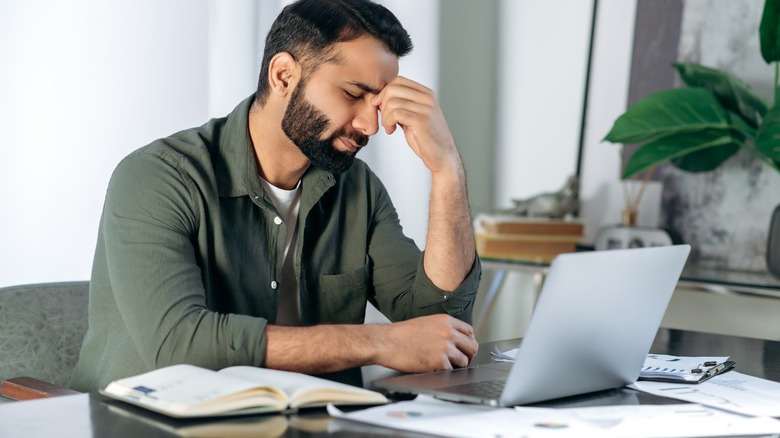You’ve been having a problem with your tooth that’s been bothering you for a few weeks now. So, you made an appointment with your dentist and now the problem with your tooth is fixed, but your head throbs. Getting a headache from dental work is common and shouldn’t cause any concern. However, you might want to let your dentist know next time so they can take the proper precautions to help you come out pain-free.
But why does your head hurt after a dental visit? The answer isn’t as clear as it might seem. The reason behind your headache might be due to the visit itself. For example, a simple teeth cleaning can cause anxiety and lead to a tension headache. Your headache might also be due to the medications used by your dentist when filling a cavity or extracting a tooth. The pain in your temples can also come from the position of your jaw being open for an extended period of time. Additionally, getting your teeth cleaned or worked on might affect your sinuses causing a sinus headache.
We’ll help you learn what each headache feels like and the root causes behind them. We’ll also provide a few tried and tested methods to help relieve your pain now.
Dental anxiety can cause a headache
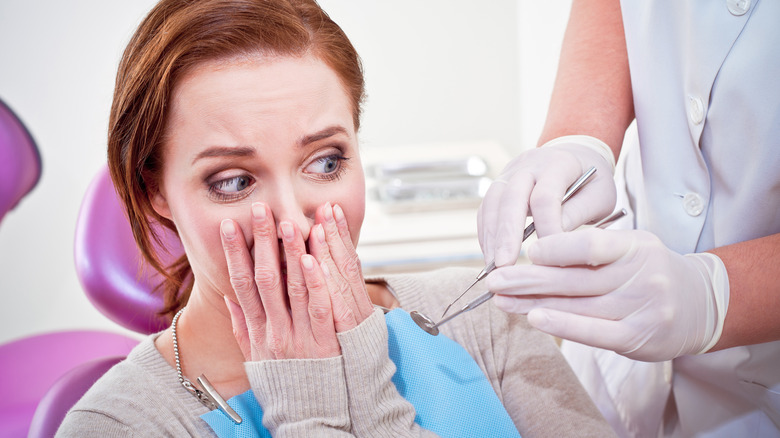
Fear of the dentist is common, according to WebMD. They note that between 9% and 20% of Americans avoid the dentist due to the fear and anxiety associated with it. Additionally, Better Health Channel reports that dental phobia could leave you stressed and anxious when sitting in the waiting room. Symptoms of dental anxiety include sweating, racing heart, low blood pressure, tense muscles, and feelings of panic. These overwhelming triggers can cause a stress headache during and after your dental appointment.
A stress or tension headache doesn’t have one specific cause but is typically related to the muscle contractions in the head and neck, states Johns Hopkins Medicine. These headaches are usually felt on both sides of the head and include a dull ache. You might also feel pain in your neck and shoulders. The onset of a tension headache is slow, and the pain is typically mild.
To avoid the headache, it’s essential to try to calm your anxiety and fears. This might require taking medication before your visit. It can also be helpful to try deep breathing and calming techniques when waiting for your appointment. A 2024 study in Acta Biomedica found that music can help with cortisol, blood pressure, heart rate, and body temperature if you listen to it while in the dentist’s chair.
Jaw strain can also cause a headache
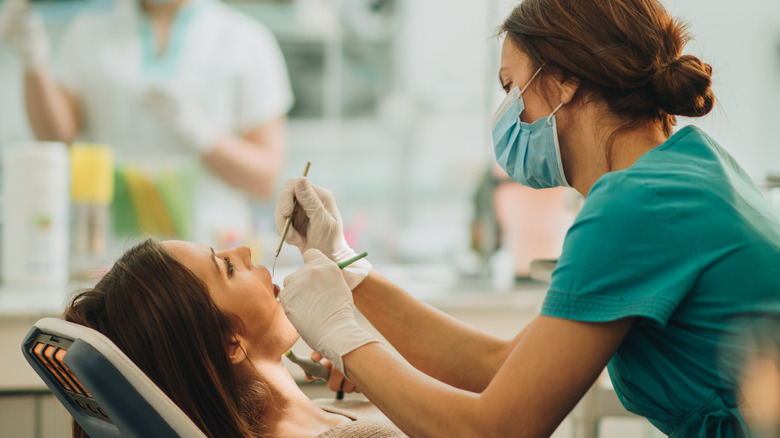
Whether you’re getting your teeth cleaned or a cavity filled, an appointment with your dentist requires you to keep your mouth open for an extended period. Since your jaw isn’t used to this, it can put pressure on the temporomandibular joint (TMJ) and create muscle spasms, explains the Oral Health Foundation. This muscle pain could cause a headache after the visit is over.
TMJ headaches are felt on the tops of the cheeks and along the sides of the head, per Healthline. You can also feel tight facial or jaw muscles and facial pain, especially when moving your jaw. Dental Implant Specialist Centre also notes that pain around your eyes and temples is common. The headache is quite similar to a tension headache in that it comes on slowly and feels more like a dull ache rather than a stabbing pain.
Since the headache is coming from the muscles in your jaw, this is the area that you’ll want to treat. Applying a warm compress or ice to your jaw can help relieve the swelling and inflammation in the TMJ. It can also be beneficial to take anti-inflammatory medication, like NSAIDs. Thankfully, as your jaw soreness eases, so will your headache.
A dental visit could lead to a sinus headache
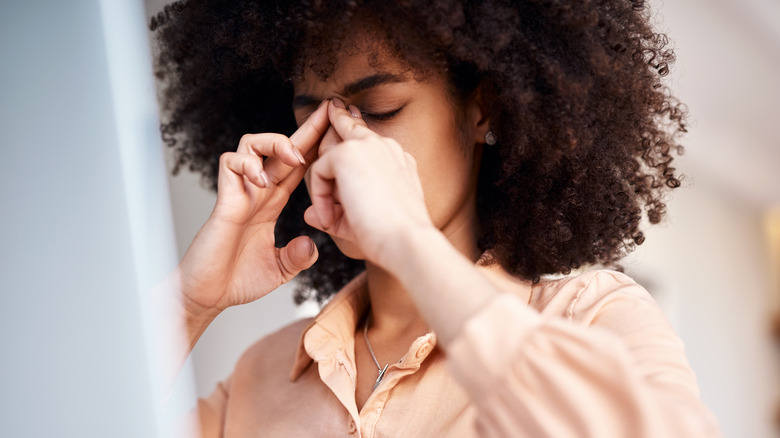
Hiraman/Getty Images
All the areas in your face are connected in one way or another, so your teeth can play a significant role in facial pain and headaches. There is a reason for the saying “throbs like a toothache.” Therefore, getting dental work done or having a dental infection can affect your sinuses and lead to a sinus headache and even a sinus infection (odontogenic sinusitis), per Enamel Dental Center.
A sinus headache typically includes pressure around your eyes, cheeks, and forehead. It will be worse when you move your head down, creating a throbbing pressure in the front of your face. Some people also feel a throbbing pain in their teeth. If the headache progresses into a full-blown sinus infection, you might also experience fatigue and fever. The American Rhinologic Society also notes that pain can be on one side of the face.
For a sinus headache, try using a saline solution to help to flush out your sinuses. Steam can also open up the sinus cavity to let everything move its way out. Relieve inflammation by applying warm compresses to the face, according to Mayo Clinic. When it progresses into odontogenic sinusitis, visit your healthcare provider to get a prescription for antibiotics.
Local anesthesia can sometimes give you a headache
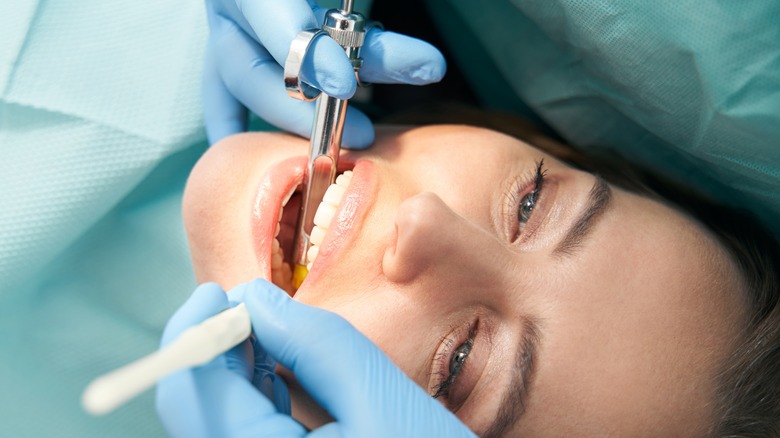
YAKOBCHUK VIACHESLAV/Shutterstock
Depending on what you’re getting done at the dental office, it may require local anesthesia to numb the area for an extraction, cavity treatment, or even a crown. Local anesthesia works by stopping the signals to nerves in that area, meaning you don’t feel any pain when a dentist is working on your teeth, according to NHS. It’s great during your procedure because it makes it easy to sit calmly rather than go under general anesthesia. However, these medications may have a few side effects, including a headache.
A study in the Journal of Dental Anesthesia and Pain Medicine found that 2.7% of people experienced headaches after using local anesthesia. The severity of the headache correlated with the specific medication used and the amount. Higher concentrations could produce more adverse effects like headaches.
A headache associated with medication will be short-lived and wear off with time. Taking over-the-counter pain meds and relaxing can help to dull the pain. It can also be beneficial to drink lots of fluids to help move the anesthesia out of your system.

